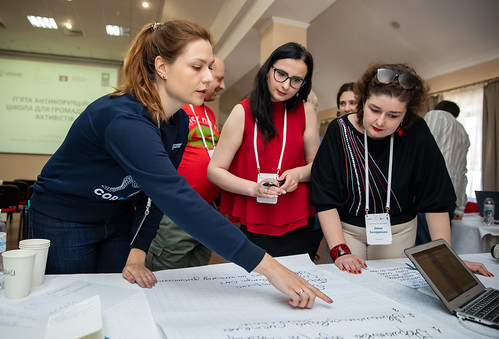Photo credit: Roman Lysovsky
Kyiv, 27 May 2019 – Twenty-four public activists and 24 representatives of youth organizations from 18 oblasts of Ukraine mastered innovative methods for combating corruption at two anti-corruption schools held on May 21-24 in the town of Hlibivka, Kyiv Oblast.
The activists and young people discussed how to create positive changes and influence the government (including through conducting a dialogue with state bodies), improve the quality of public policy-making, and develop cooperation with their local communities.
According to a 2018 nationwide survey, some 36.4 % Ukrainian citizens are ready to actively join in the fight against corruption. However, despondency over the prospects of creating positive changes (71.8% of respondents), a lack of guarantees of personal protection for anti-corruption activists (70.9%), distrust in the authorities in the fight against corruption (affecting 68.3% of citizens), and the lack of information on social measures to overcome corruption (2/3 of the respondents) were seen as major obstacles to participating in anti-corruption initiatives.
“Anticorruption reform remains an urgent need for Ukrainian society,” said Gunel Babakishieva, anti-corruption expert from the Eidos Centre for Political Studies and Analysis, commenting on the event. “The Law “On Prevention of Corruption” introduces new methods for combating corruption. Thus, the civil society can track potential corruption risks for public servants, such as conflicts of interest. And e-declarations are also useful in this regard.”
Civic activists also learned how to work with the public information requests, open registries and databases, as well as learning about the local democracy tools.
“Having open data makes it easier for civil society to monitor the authorities and has been the trigger for numerous journalistic investigations,” said Anton Stolyarov, an investigative journalist with the Bihus.Info group of anti-corruption and information projects.
“For example, with the open registries one can track which company repairs the city roads, check the price of the services provided, and even find out who is the final company’s owner. The secret is simply knowing where to look for it!”
Participants of the anti-corruption schools also mastered effective communication approaches through social networks and media to promote integrity, decency and transparency among their peers.
“To overcome corruption, it is crucial to develop first a culture of intolerance for corruption in Ukraine,” said Tetyana Sushko, a freelance journalist and one of participants of the anti-corruption school for young people. “For that, we need to know about the existing anti-corruption tools, follow the key trends, share the principles of transparency and accountability, look for available resources to launch advocacy campaigns, successfully implement projects, and to communicate properly with heterogeneous target audiences. Young people can and should become one of the driving forces in anticorruption movement.”
Young people could become change-makers, introducing transparency, openness and inclusiveness in policy-making in their local communities,” said another participant in the school, Taras Repetsky, the Chairman of the Board at the Institute of Public Initiatives. Awareness of the existing anti-corruption tools will help to build democratic inclusive institutions both at local, and at the national level, he believes. The civic activist believes that these anti-corruption schools are extremely important for building a civil society that does not tolerate corruption and spreading knowledge of effective tools for combatting corruption through the educational and advocacy activities.
The anticorruption schools for civic activists and young people were organized as part of the cooperation partnership between the “Civil Society for Enhanced Democracy and Human Rights” project of the United Development Program in Ukraine, and the Support to Anti-Corruption Champion Institutions Program project of the United States Agency for International Development and the International Renaissance Foundation.


 Locations
Locations




